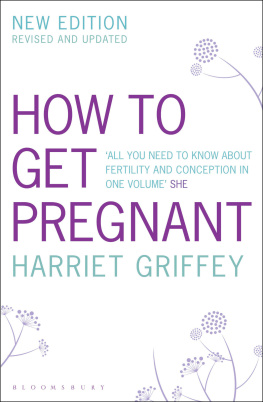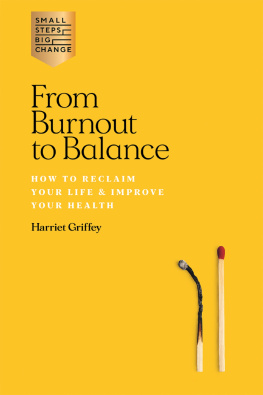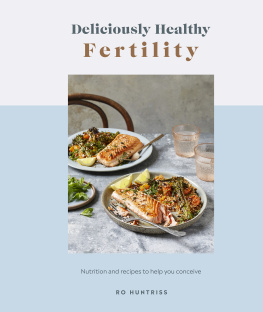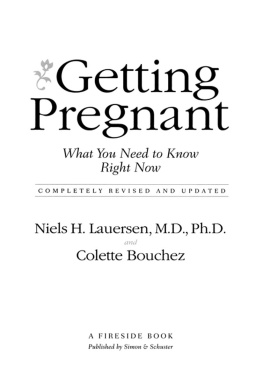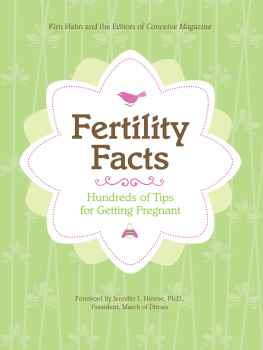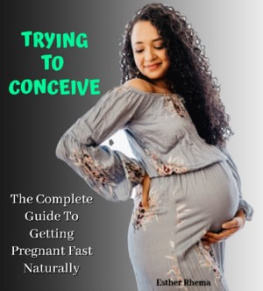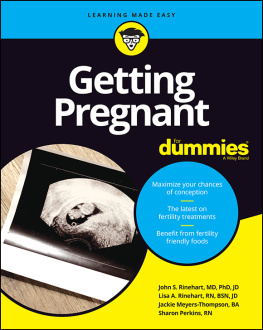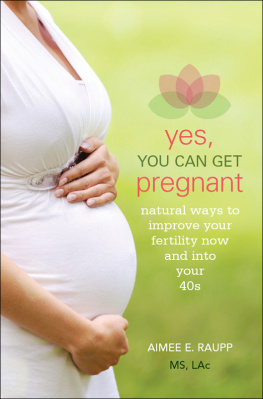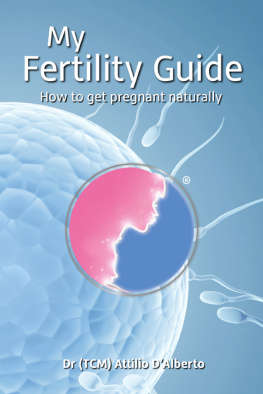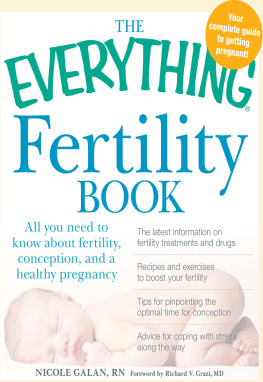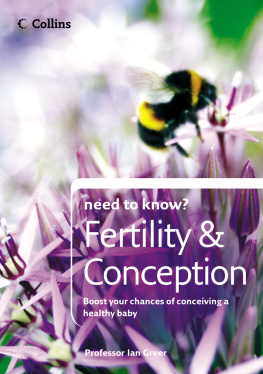HARRIET GRIFFEY is a freelance print and broadcast journalist who writes regularly for UK national newspapers and magazines. She originally trained as a nurse at the Middlesex Hospital, London but subsequently worked in book publishing, television, radio and journalism. She is the author of numerous books including The Really Useful AZ of Pregnancy & Birth, The Art of the Nap , Boost Your Childs Immune System and The Art of Concentration . She has two sons and lives in London. www.harrietgriffey.com
Authors acknowledgements
Many people have been helpful in the writing of this book and particular thanks are due to Susan Rice at ISSUE, the National Fertility Association; Clare Lewis Jones at the Infertility Network UK; Sandra Dill of ACCESS; Tamsin May at NIAC; the late Dr Anna Flynn; Dr Rachel Pettigrew at the Assisted Conception Unit, St Thomas Hospital, London; Belinda Barnes at Foresight; and to Emma Dally at the National Magazine Company. While their support and comments have been invaluable, the final responsibility for the books content must rest with me.
I would also like to thank all those women and men friends, and friends of friends who were kind enough to share their experiences of getting pregnant, in one way or another, with me. This book is dedicated to them and to my own two children, Josh and Robbie.
Pregnancy
I was so excited when I saw that thin blue line in the dipstick of the pregnancy test. It seemed such an extraordinary thing, that I should be having a baby! Youd never have thought that millions of women had done it before me!
Judith, aged 31
When the result was positive, instead of thinking, how wonderful, my heart sank. I was so afraid something would go wrong, I didnt dare feel optimistic about it. It was weeks before I could allow myself to believe that I was actually going to have a baby and I didnt feel like celebrating until I saw the scan. It made it very hard on Bob, because I just didnt want anyone to know for a bit.
Lucy, aged 29
It was such a relief to get pregnant. I felt as if I could get on with my life now, although in reality I knew nothing would ever be the same again!
Tricia, aged 35
Whether or not conception has been a long-drawn out battle or a relatively straightforward process, discovering that you are pregnant invariably brings about mixed emotions. Relief, euphoria, fear and excitement are all normal reactions, whatever your situation, because a positive pregnancy test is just the first step and problems can still arise. So it is hard to relax and actually believe that this pregnancy is going to result in a healthy baby in nine months time. The individual, and very personal, experience of getting pregnant will quite naturally colour how you adjust to being pregnant.
Women with a history of infertility, and in particular those who have conceived through IVF and other reproductive technologies, plus those who have experienced miscarriage either once or repeatedly, may quite naturally begin their pregnancies with less confidence than others. Conception, and pregnancy, is already something that has potent psychological overtones connected to the idea of failure, and this may influence ideas about how pregnancy should be managed physically. Having had a lot of involvement with medical expertise, many women find that once pregnancy occurs they feel rather abandoned. However, an IVF pregnancy, once confirmed, is just like any normal pregnancy. It also means it carries much the same risks of miscarriage or ectopic pregnancy, for example. But with so much invested in the pregnancy before it occurs, any subsequent problems can seem much greater, which can be hard to keep in perspective. Although with each passing day and week as pregnancy continues, it becomes easier to feel confident that all is going well.
There is no doubt that pregnancy, under any circumstances, has the potential for increasing stress and anxiety however much the event is also a cause for celebration and happiness. The impact on a couples relationship can be profound, and can shake up the assumptions on which it may be based. While some couples find that the whole process draws them together and strengthens their relationship, others find that the tensions that can arise are almost too difficult to solve alone. Negotiating feelings of hope and fear, while trying to get on with day-to-day living, can be very hard. Many infertility centres offer the opportunity for counselling for couples undergoing treatment and it is a facility that should be taken advantage of if available. Otherwise it may be sensible to seek help and support independently, or from one of the specialist charities, for example, the British Infertility Counselling Association (see Useful Addresses), who will also be aware of the continued anxieties that arise even after conception has occurred.
He was so full of the baby this, the baby that, and kept coming home with things for the baby, that I began to feel like some great seed pod for his offspring. I know it was his way of trying to be involved, but he nearly drove me mad. In the end we had an enormous row but managed to clear the air. Needless to say, it got better after that!
Angela, aged 37
One of the problems couples may find after a long period of trying to get pregnant, with or without medical help, is that it is difficult to get back to normal after pregnancy is confirmed. It is almost as if the pregnancy alone was the sole goal, rather than a transitional stage on the way to becoming parents. In one way nothing will ever be normal again, as having a baby brings about enormous, and relevant, changes and this is the same for everyone. But where so much has been invested into the possible birth of a baby, the context is slightly different.
It is quite characteristic for women, facing the physical reality of their pregnancy day by day, to become very absorbed and preoccupied by it. The extent of this will be influenced, in part, by their experience of conceiving and, where this has been difficult, the internalised anxiety may make a woman very preoccupied. It is as if she dare not stop thinking about it, in case by letting go emotionally she may somehow let go physically and lose the baby. This preoccupation may mean excluding her partner in some way that has not happened before and this newly intrusive component to the relationship needs some readjustment, which may take time. In addition, if physical concerns and worries mean a woman feels less like being sexually intimate, it is all too easy for feelings of rejection, alienation and resentment to escalate. Suddenly this longed-for baby becomes the reason for all sorts of tensions that did not seem to exist before. Working out what may be a normal reaction to a sequence of events can be difficult, so keeping open lines of communication, while a clich, is imperative while trying to chart these unknown waters.
I know John felt that, now I was actually pregnant, he was somehow redundant. It was partly because I felt so sick and irritable during the first few months and, way down deep, I felt he was partly to blame. It was as if this baby, which we had wanted and planned together, was coming between us. It wasnt him feeling like death day in, day out, and I resented it. Luckily we were able to talk about how we felt and, after the first few months adjusting to it all, things settled down.
Sara, aged 32
TESTING FOR PREGNANCY
Urine tests
The simplest way to test for pregnancy is to use a test manufactured for use at home, bought from the chemist. These urine tests are considered to be 99% accurate under laboratory conditions, but following the instructions closely at home will be good enough! These tests can be used from the first day of a missed period, and although they say that any urine sample is fine, first thing in the morning means that the concentration of pregnancy hormone in the urine is greater.
Next page
